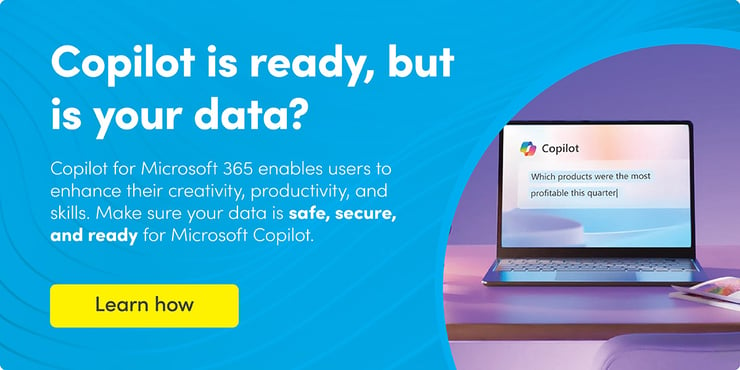Why Every Organization Needs a Copilot Strategy in 2025
Artificial intelligence isn’t coming; it’s already here. According to Microsoft’s 2024 Work Trend Index, 75% of employees are already using AI at work, and nearly half only started in the last six months. The question for business leaders in 2025 is no longer if employees will use AI, but which AI they will rely on.
Without a clear Copilot strategy, organizations risk fragmented adoption, shadow IT, and potential data exposure. A strategy ensures AI is deployed securely, responsibly, and in ways that maximize business value.
Why Copilot, Not Just Any AI?
It’s no secret that employees experiment with consumer AI tools. While convenient, these services often come with risks: lack of enterprise security, unknown data retention practices, and models that may train on user data. By contrast, Microsoft Copilot is designed for the enterprise:
- Enterprise Data Protection (EDP): Copilot follows the same security, compliance, and governance policies as the rest of Microsoft 365.
- Your Data, Not Their Training Set: Microsoft Copilot does not train on your business data. Content stays within your Microsoft 365 and Azure boundaries.
- Permissions-Respecting: Copilot only surfaces what users already have access to. If oversharing exists, it highlights a governance gap, not a Copilot flaw.
- Trusted Compliance: Built-in auditing, sensitivity labels, and data loss prevention (DLP) policies help organizations maintain regulatory compliance.
Simply put: Your employees are already using AI--why not ensure they use one that’s safe, secure, and governed?
What a Copilot Strategy Covers
- Governance & Security
- High-Value Use Cases
- Start with a clear ROI. Common early wins include:
- HR: Answering policy questions, onboarding checklists, and PTO requests.
- IT: Automating password resets, software provisioning, and ticket triage.
- Finance: Drafting reports, monitoring expense compliance, and summarizing invoices.
- Start with a clear ROI. Common early wins include:
- Change Management & Training
- Copilot is most successful when employees know how to use it. Establish Copilot champions, provide prompt-writing workshops, and track adoption through usage dashboards.
- Data Readiness
- Review oversharing risks in SharePoint and OneDrive, apply sensitivity labels, and clean up inactive or ownerless sites before rolling out Copilot broadly.
- Continuous Improvement
- A Copilot strategy isn’t “set and forget.” Regularly measure adoption, satisfaction, and ROI. Refine prompts, expand scenarios, and add new agents as employees mature in their usage.
The Competitive Edge in 2025
Organizations with a Copilot strategy already report:
- Faster decision-making from AI-powered insights
- Scaled service delivery without proportional headcount increases
- Reduced time spent searching for files or writing first drafts
- Higher employee satisfaction from faster, more consistent support
Meanwhile, organizations without a strategy face data governance gaps, tool sprawl, and lost opportunities to drive growth.
Final Thoughts
2025 is the year of enterprise AI maturity. Employees will use AI regardless. The choice is whether they use unsecured consumer tools or Microsoft Copilot with enterprise-grade security, compliance, and privacy.
By building a Copilot strategy, you:
- Protect sensitive data
- Deliver consistent, high-value use cases
- Align AI adoption with business outcomes
At Synergy Technical, we guide organizations through readiness assessments, governance planning, and Copilot adoption frameworks. The result? Safe, scalable AI adoption that drives measurable business impact and increases productivity.
If your organization wants to improve productivity by using Microsoft 365 Copilot, Synergy Technical can help. Our Microsoft 365 Copilot Readiness Assessment will validate your organization's readiness for Copilot as well as provide recommendations for configuration changes prior to implement. We'll help you make sure that your data is safe, secure, and ready for your Copilot deployment.




Comments